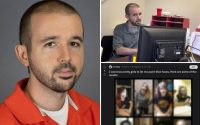St. Louis transgender clinic hastily prescribed hormone drugs to kids: report
Explosive claims that a Missouri children’s transgender clinic was hastily prescribing hormone drugs to some young patients, including those with psychiatric issues, have been corroborated — some seven months after a whistleblower first came forward but was quickly slammed by critics as a liar.
Jamie Reed, 42, a former case worker, emerged in February with damning allegations that the Washington University Transgender Center at St. Louis Children’s Hospital was doling out the hormone drugs to kids with very little oversight of their mental health issues.
Now, the New York Times has confirmed elements of her allegations — including that the center failed to help some who regretted their transitions — after speaking with dozens of patients and reviewing hundreds of pages of documents detailing the center’s care plans.
Documents and emails obtained by the outlet show that the St. Louis clinic relied heavily on external therapists, including some who had little experience with gender issues, to vet the incoming patients to see if they should be prescribed hormonal medications.
The vetting process involved making sure patients had identified as trans for at least six months, had consent from their parents and a letter of support from a therapist. Doctors then doled out the medication to those approved patients — even to those with psychiatric diagnoses that had raised “red flags.”

Reed, who quit the center last November after four years over what she described as “morally and medically appalling” practices, said she and another staffer had created their own “red flag list” because the clinic had no system of patient tracking.
Their list included 60 youths who had psychiatric issues, including one testosterone-taking patient who stopped taking their schizophrenia meds without consulting a doctor.
A different patient had also been in a psych unit for five months, while another experienced hallucinations.
Reed and her colleague wound up conducting at least six training sessions with emergency room staff in August and September last year amid an influx of young transgender patients coming in experiencing mental health crises.
Her coworker subsequently emailed her team and university admin to flag that ED staff were concerned about treating at least “one TG patient per shift.”
“They aren’t sure why patients aren’t required to continue in counseling if they are continuing hormones,” the staffer wrote in her email, adding they were concerned that “no one is ever told no.”
Meanwhile, some patients also claim the center ignored their calls for help after they decided to de-transition or stop taking hormone treatments, the emails reportedly show.

One patient had reached out to the center in January 2020 to say they had de-transitioned and needed help getting a coach to help with their now-masculine voice, according to the reported emails. They added they were also seeking an autism referral, writing: “I have mentioned this before at appointments and over email, but it did not seem to go anywhere.”
Another patient, named Alex, told the Times she ended up de-transitioning three years after she was prescribed testosterone by the center.
She recalled being prescribed the drug when she was 15 in 2017 after identifying as trans for three years and being referred to the center by a therapist.
“There was no actual speaking to a psychiatrist or another therapist or even a case worker,” she said of being given the drug.
When she eventually told the clinic that she’d realized she was nonbinary and no longer wanted testosterone injections, Alex said the nurse was dismissive and said there was no need for additional follow-up appointments.
In a statement, the university insisted the center prioritized mental health care and that “patients have ongoing relationships with mental health providers.”
The Times noted that some of Reed’s initial claims, which were first aired in The Free Press, couldn’t be confirmed and that one included factual inaccuracies.
Reed’s claims sparked an investigation by Missouri Attorney General Andrew Bailey into the clinic’s practices, as well as an inquiry by Republican Sen. Josh Hawley.
At the time, several families of patients lashed out saying Reed’s allegations didn’t align with their experiences.
“The idea that nobody got information, that everybody was pushed toward treatment, is just not true. It’s devastating,” Kim Hutton, whose son was a patient at the center, told the St. Louis Dispatch. “I’m baffled by it.”


